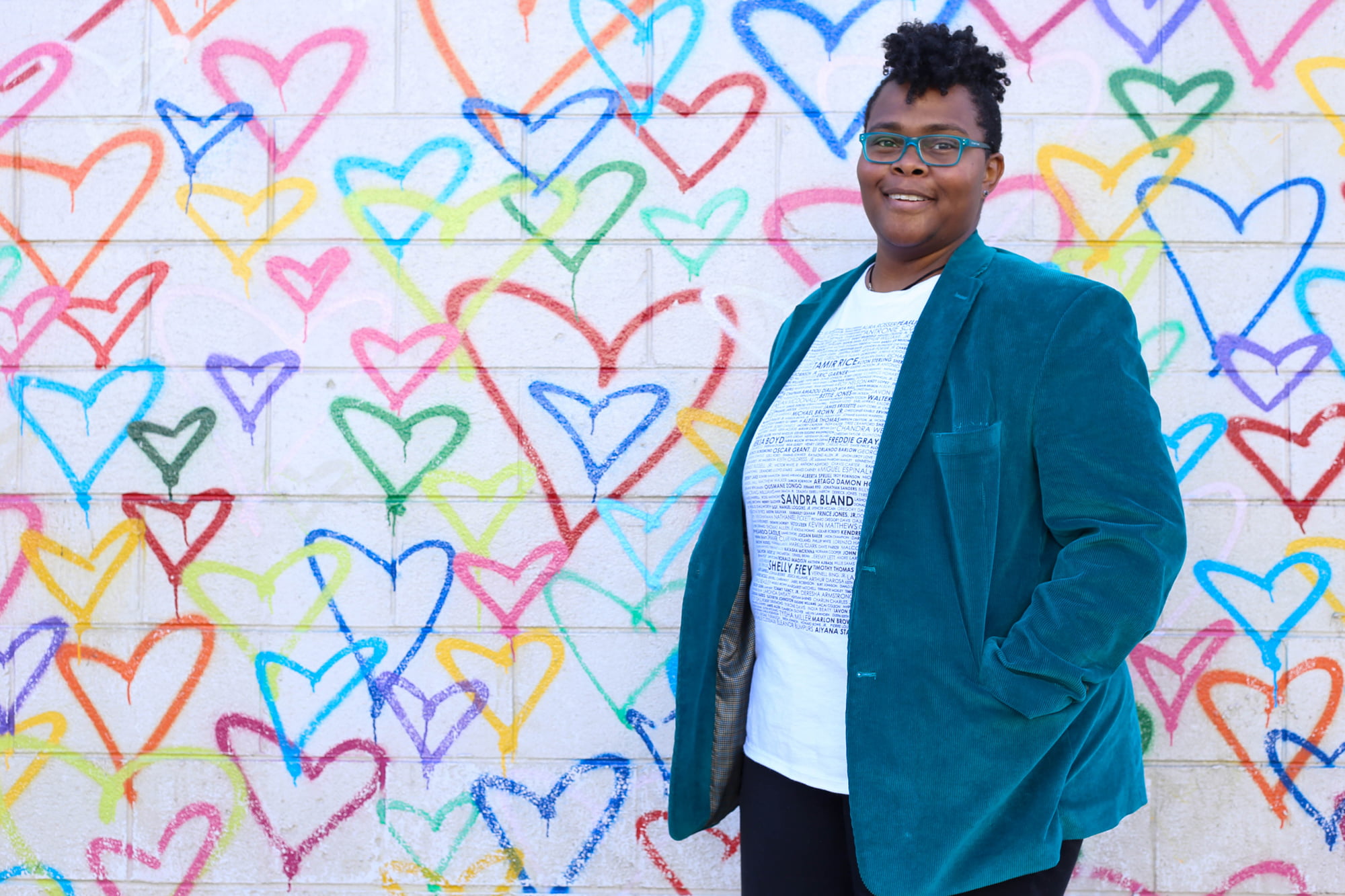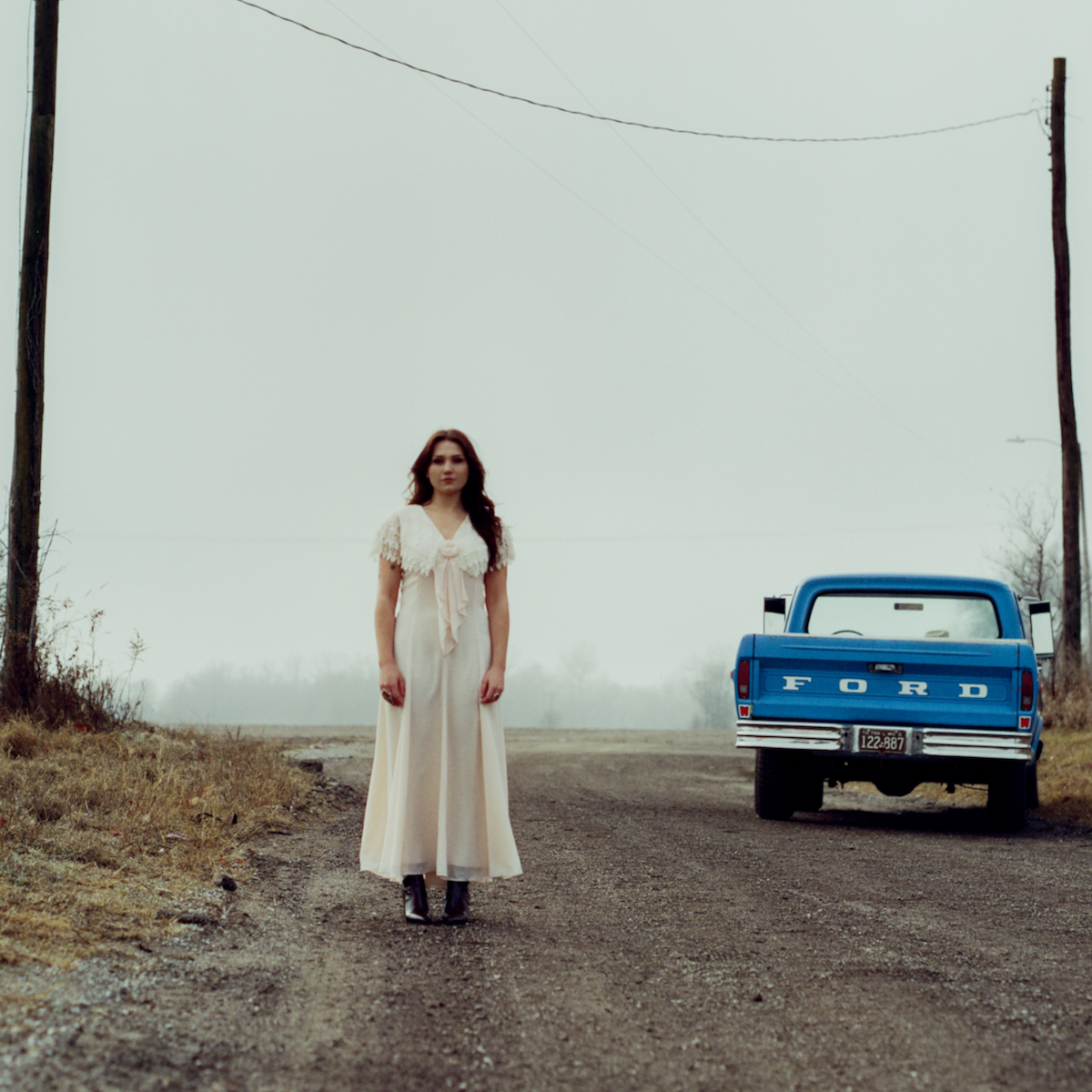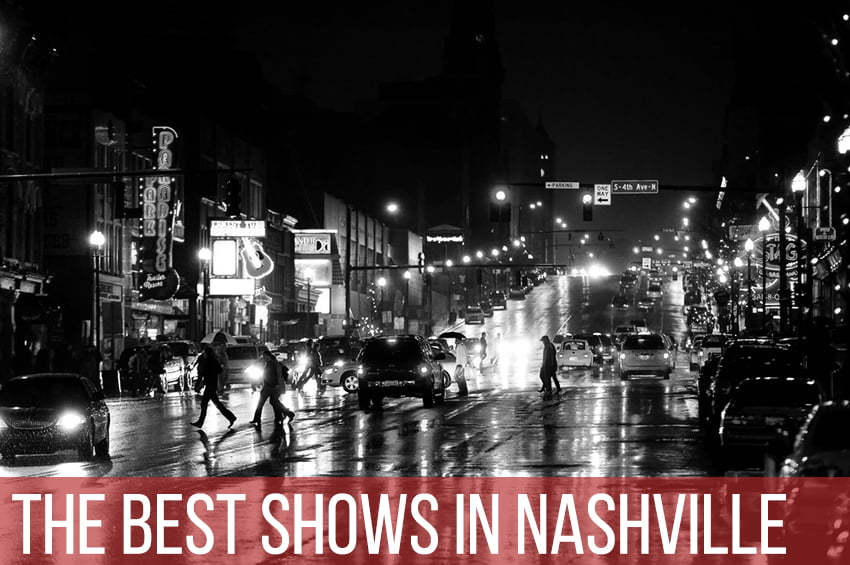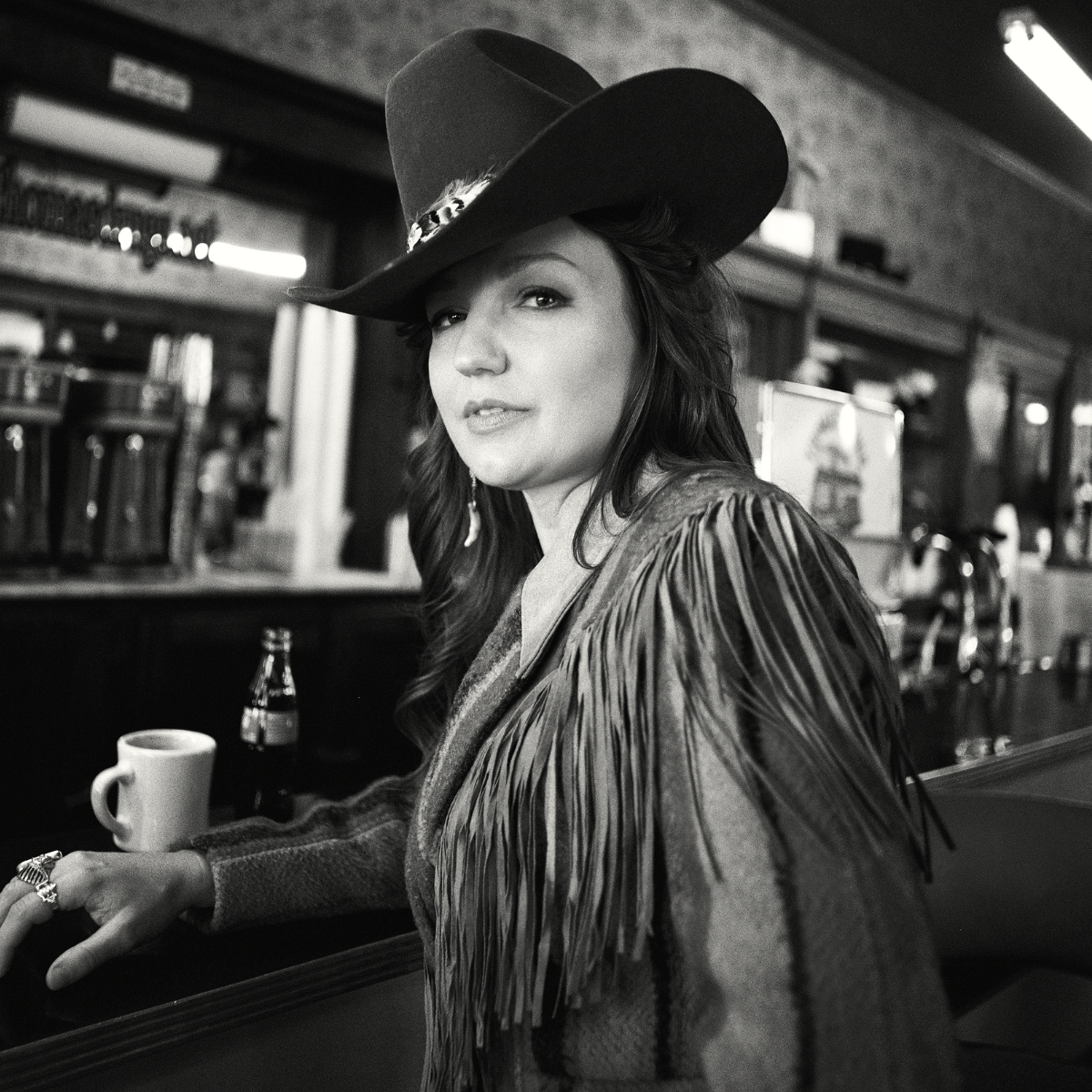After she describes her multi-faceted identity, Americana and country soul singer/songwriter Crys Matthews laughs with a slight trace of self-deprecation, “I’m the poster child for intersectionality, right?!” She is.
While each and every day, on each and every media platform, we’re reminded of the division, alienation, marginalization, and divisiveness rampant in our country (and our world), we’re not often enough met with people like Matthews who exist as reminders of what beauty can occur when we bridge those divides.
A native of the South and the daughter of a preacher, this Americana-creating, Black lesbian — who is in an interracial marriage — understands and appreciates the myriad ways her background informs her ability to help others empathize with those with whom they might assume they have nothing in common. With her recent full-length album, The Imagineers, and her compassionate, politically charged EP, she is recruiting an “Army of Lovers,” despite all of the divides — real or perceived — that come between us, driving out hate not with hate, but with love.
Country or Americana or roots music fans might not expect someone described like you to fit into this music. How did you come into roots music? What’s your background in it?
I was born and raised in North Carolina — I live in Virginia now — and I went to college at Appalachian State University in Boone, North Carolina, which is a bluegrass Mecca. I never set out to really create [within] any specific genre of music or anything like that. My songwriting process, it’s very organic. The songs just come out how they come out. Living in Boone all that time, I just fell in love with the Blue Ridge and with all of that. I guess osmosis is what you would say — it just fused its way into my music and into my songwriting style. It seems like every year it just gets country-er and country-er, which is hilarious to me. [Laughs] Listening back through the newest album I was like, “Oh, my God, my grandpa would be so proud!”
Did your grandpa get you into country music?
Oh yeah, we’re so Southern. Like I said, born and raised in North Carolina, but in the southeastern part of North Carolina. It is so country over there. [Laughs] I grew up watching The Dukes of Hazzard and other stuff that you wouldn’t necessarily expect. I guess it feels foreign to people when they think about, okay, “A Black lesbian isn’t going to be watching Dukes of Hazzard with her grandpa.” But, if you grew up in southeastern North Carolina, I’m pretty sure almost everyone watched The Dukes of Hazzard no matter what, no matter who you were. I’ve never lived my life trying to fit into any specific thing. I just am who I am, and the things that I’m into are just the things I’m into. The things I think about, think are beautiful, and love in the world center so heavily around my home state.
The title track of your EP, Battle Hymn for an Army of Lovers, is an upbeat, hopeful number. It’s looking to the future and outward-facing, but it’s also very realistic and grounded. It’s not denying the realities of this moment in time. Why did you strike that balance?
I always try to be like that in life. I feel like every big moment that has ever happened in this country has happened, at the root of it, because of love. And because of somebody loving somebody else and/or not being okay with the person that they love not having fair treatment, in some regard.
My worldview is that love is always the thing that moves us forward. It always is and it probably always will be. It’s super important to me. As frustrating and hard as this moment is for me, obviously, as a triple-minority, it is terrifying for me living in this time, I trust and believe so deeply that love will move us forward. It was very important for me to use that song and use that message for rallying the army of lovers, mobilizing the army of lovers, and believing wholeheartedly in trying to live that notion of Dr. King’s, that hate cannot drive out hate, only love can do that.
I appreciate in your music that you’re including specific calls to action. In your song “Paris Is Burning,” you sing, “Dark days call for more than profile picture overlays,” and that line resonates so much with me because we’re in a time when just showing up doesn’t really count for much anymore. You aren’t letting listeners and fans feel like just putting on your EP is taking action.
Again, growing up in the South, the history of activism, what it means, and how important it is is not lost on me. Being a singer/songwriter, having a platform, and with people actually listening to what I have to say, it would be so hypocritical to not use that platform, in some regard, to actually have a call to action, to let people know what’s happening in the world beyond their possibly limited view, let them know things that they can do to help. And people who aren’t them, who may not have whatever privilege they may have, need them to help. It was super important to have the mindset of the soundtrack of the resistance.
I went into it hoping that it would come out in a way that would motivate people, and inspire people, and make them do something. It’s so hard feeling so powerless, and I think so many of us are so frustrated right now, because we feel powerless, but we’re not. It’s important to remember that. I hope that these songs remind people that there are things that we can do. We cannot be complacent. We have to act.
As a triple-minority, like you said before, you don’t exactly have the luxury or privilege of choosing how much or how little of your identity is visible through your art, but I wonder if you think about how much you present in your songs, or if you just let that happen organically, as well?
It depends on certain songs. I have this song from my album, Come What May, called “You Remind Me,” that [was inspired by] the Lovings of Virginia [of the U.S. Supreme Court case on interracial marriage, Loving v. Virginia] and Edith Windsor and Thea Spyer [of the case United States v. Windsor on same-sex marriage]. It’s about how we keep having to learn the same lesson in this country about love, and how we can’t seem to let people love who they want to love. It’s a parallel of those two things and, of course, my wife and I decided we wanted to piss everybody off and be an interracial, lesbian couple. [Laughs]
The love songs, for me, I feel like those things are just so universal. Only people who don’t realize how universal they are think that they’re different and weird. People are like, “Oh my God! Gay marriage!” And I think, “If you could just see us sitting on the couch with our cats and dogs and bunny, being like, ‘Are we going to watch TV? What are we doing?’” It’s so boring! [Laughs] It’s just what everyone else is doing on their couch at the end of a work day. It’s crazy that we even have any kind of distinction between the two, because it is literally so boring.
Me, personally, I’ve been married for four years. In general, we’re just as mundane as every other person who’s been married for four years. In the love songs, I don’t try to make an effort to make them any more “normal” or any more heteronormative. That’s just the reality of it. I think that people would be better served to actually realize and know that. It’s always fun for me, when I write a song that’s about my life, and somebody’s like, “I feel the exact same way about my husband!” or “I feel the exact same way about my wife!” Because inside I’m like, “Yes. That’s the point.”
That’s what it means to be human.
Exactly. The best line I think Jason Mraz ever wrote was in regard to humanity. He says, “Our name is our virtue.” That’s so much it. If we could just be more human, that’s all we ever need to do.
How do you think we can bridge the gap that divides all of us right now? Do you think it’s just playing these songs and letting it filter in for people?
I do. I really do. The hard thing for us to do is engage one another. It’s a scary thing — rejection is a scary thing, being the butt of somebody’s anger is a very scary thing — but we have to engage each other. I sing the songs that are a little more difficult in places where it’s not necessarily the most advisable thing for me to do. Ultimately, if I don’t make those people think, if I can’t make them feel something or think something, they’re not going to do it on their own, because they’re only going to be hanging out with the same type of people. I feel like we have a responsibility to put ourselves in those uncomfortable situations for the good of the whole. We have to do it.
It’s very difficult traversing this world with a limited worldview. It’s so easy, for so many of us, to just be comfortable. If you’re a 30-year-old white guy, with all of your 30-year-old white guy friends, it’s not that you’re a bad person; it’s not that you don’t care about anyone else’s issues or their daily life. It’s just not your reality because it’s not something you see every day. Worldviews are so different. Simple things can help people think, but it’s so much easier to be comfortable. Whereas, with me, I don’t really have a choice. I’m always in various multi-cultural situations. If more of us did that, it would just be second nature to realize what somebody else’s walk through life looks like because you aren’t just having to imagine it; you’re literally standing there watching it.
Photo credit: Sarah Stuart



